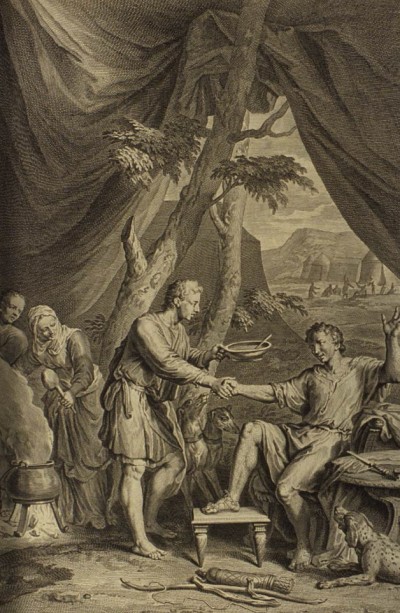At the beginning of his essay “Contract and Birthright,” the political philosopher Sheldon Wolin revisits the story in Genesis where Esau sells his birthright to his brother Jacob for a bowl of stew. As Wolin sees it, Esau “bartered what was unique and irreplaceable for a material good for which there was a number of available substitutes.”1 Esau divests himself of his inheritance, of the unique and historical identity that has been passed down through his family for generations; he sells his history in the same way that we may sell a television, a toaster or, yes, a can of soup.
Like the space we now inhabit, on the backside of this exchange Esau finds himself in a world of contracts and commodities where history and singularity do not matter, where nothing is unique or sacred and everything can be bartered. Perhaps we sometimes see separation from history and tradition as a liberty of sorts, as a break from the crude and oppressive authority structures of the past. And yet, at the same time, many of us sense that this land without birthrights is a lost one. The new unencumbered world of Esau lacks thick identities, a sense of history, and that deeper sense of place within a tradition.
The following essays are adapted from the inaugural Duke Graduate Conference in Theology, which focused on the topic of Tradition and Traditions. As stated in the conference description, these essays aim to address the fact that “in the past century, the study of Christian theology has been marked by a renewed interest in patterns of thought and ways of speech that have resonance with the historical development of the church. Variously called ressourcement or ad fontes, this renewed interest has impacted nearly all fields of theology, including biblical studies, ethics, historical studies, practical theology, and systematics. Scholars regularly invoke the language of tradition, traditions, or ‘The Tradition,’ whether in order to locate their work within a specific tradition or set of traditions, or in order to provide a warrant for a theological claim. Yet this turn to tradition has not been received with universal satisfaction. Concerns about the relationship of ‘tradition’ to Scripture and issues of power—especially in regards to alienation, colonialism, patriarchy, and cultural violence—remain and highlight the need to recognize the multiplicities of histories and voices. In light of such issues, and given the likelihood of their ongoing significance for theology, a critical assessment of both tradition and traditions is in order.”
The Tradition and Traditions conference was held at Duke University Divinity School from October 4 to October 5, 2013. The Other Journal, in collaboration with the conference committee, has made some of these essays available as a way for the larger public to see how a new generation of theologians is approaching this issue.
1. In Sheldon Wolin, “Contract and Birthright,” in The Presence of the Past: Essays on the State and the Constitution (Baltimore, MD: The Johns Hopkins University Press, 1989), 137.
